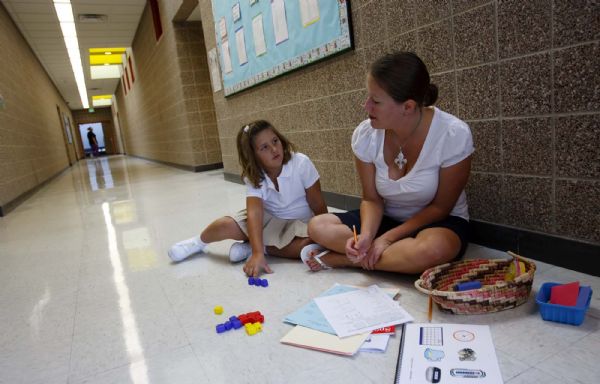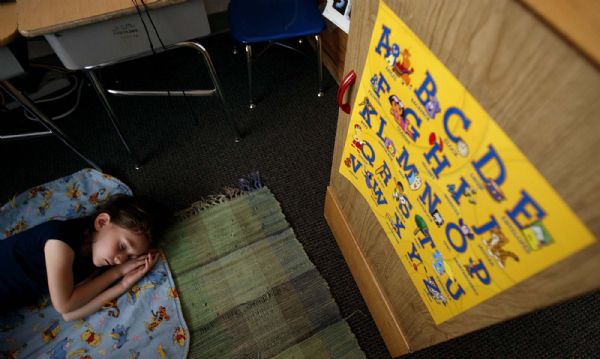This is an archived article that was published on sltrib.com in 2009, and information in the article may be outdated. It is provided only for personal research purposes and may not be reprinted.
Tyler Fisher-Barron breezes through her colors, shapes and counting but is stumped by some of the numbers that teacher Betsy Haslam asks her to name. "I'm smart because I do my homework. I do it in the morning. I do it every day," declares the 5-year-old, looking to Haslam for approval.
It's the start of another school year, and crunch time for tens of thousands of kindergartners entering the public school system and for the full-day kindergarten programs that prepare them for the big leagues, first grade.
This week and next, kindergartners throughout Utah will undergo assessments like the one given Tyler at Whittier Elementary in Salt Lake City. The 30-minute tests help teachers individualize lesson plans and set benchmarks for measuring student progress. And this year's results may persuade lawmakers to continue the state's $30 million Optional Extended Day Kindergarten initiative.
At least that's the hope of education officials.
Like most states, Utah is slowly moving away from half-day kindergarten, swayed by research underscoring the importance of early childhood education for success in learning and life.
But kindergarten, even half-day, isn't required in Utah. And money for the full-day kindergarten initiative expires in 2010-11. And with its champion, former Gov. Jon Huntsman Jr., off to China, future funding is anything but certain, especially in today's budget climate.
Whether lawmakers see fit to reinvest in the program could hinge on support from Huntsman's successor, Gov. Gary Herbert. That will depend on the state's ability to conclusively gauge the program's success.
Herbert, who once operated a child care business, "appreciates" the need for quality kindergarten programs, and he's encouraged by preliminary results showing the all-day model works, said his spokeswoman Angie Welling. But he wants more data.
That task falls to Reed Spencer, a coordinator in the curriculum department at the state education office.
Reports from school districts about the program's first year show extended-day kindergartners advanced faster than their half-day peers. Interestingly, districts also report that fewer than 5 percent of parents offered the full-day option turn down the opportunity.
But a more thorough study to be performed by WestEd, a nonprofit research, development and service agency, was shelved after researchers encountered data problems.
The kindergarten initiative is designed to give disadvantaged students a leg up and is intended for schools with the neediest students. At most schools, students who score poorly on kindergarten pre-tests are given preference for enrollment. But so many underprivileged kids are now enrolled, there's no control group to measure them against, said Spencer.
Another problem for researchers is the lack of a uniform assessment; each district has their own, said Spencer. And most districts can't adequately measure gains made by high-achieving students, since they don't test for more advanced, first-grade skills, he said. Absent that information, districts can't yet claim they're closing the kindergarten-achievement gap, said Spencer. They also can't demonstrate that all-day kindergarten is beneficial for students who are not disadvantaged.
With the help of a committee, Spencer has designed a short, statewide testing tool. But it's voluntary, and there's debate in education circles over how to best assess young children whose attention spans are short and who are unfamiliar with test taking.
"Standardized testing for kids under age 8 is so unreliable and lacking in validity, it makes no sense to do it," said Edward Miller, co-author of a new study on kindergarten testing by the Alliance for Childhood, an advocacy group in College Park, MD.
Assessments can help teachers figure out which skills to teach and to whom, but they tend to be crude instruments for gauging student success, said Miller.
He cites a famous anecdote about the parents of a kid in New York City who drilled their daughter for a year in preparation for an admissions test at a fancy, private preschool.
"Test day arrives and the psychologist sits the girl down and asks, 'What's your name?' The girl says, 'Amanda.' But that's not her name. That's her cat's name," said Miller. "And after that she answers every single question with a meow."
Miller favors longitudinal studies that follow students over many years.
But those tend to be expensive, said Spencer. "It would be nice, but we don't have the money for that."
Still, some districts are already committed to full-day kindergarten and have even invested some of their own money.
Leading the way is Salt Lake City School District, which designed its own copyrighted assessment to identify students' knowledge of uppercase and lowercase letters and sounds. It tests students' motor skills, spatial awareness and reading comprehension.
"Can you write your name? Do you know your address?" Haslam asks Tyler. And what appears to be a simple rhyming game is actually a test of Tyler's "phonemic awareness," or her ability to hear certain sounds.
"There are 44 sounds in the English language and 28 in Spanish," said Spencer. "That's a critical difference for non-native speakers."
Critics of early-childhood programs, like Head Start, point to studies showing the gains children make are lost by the third grade. But Salt Lake City Assessment Director Jo Ellen Shaeffer says 10 years of tracking her all-day kindergartners shows a different picture.
Roughly two-thirds of Salt Lake City's kindergarten programs now run all day, and the goal is to have it universally available, said Shaeffer. Economically disadvantaged students start out 40 points behind their peers on pre-tests, but catch up by year's end, said Shaeffer. "They're less likely to repeat a grade in school, and they demonstrate better achievement and have an intellectual advantage over those who needed the program but didn't get it."
Haslam is a believer.
"We get the whole range, from kids who score zero on the assessment and don't know their ABCs to those who score 100 and are already reading," she said. "But you wouldn't believe the gains these kids make. It's so rewarding."
kstewart@sltrib.com" Target="_BLANK">kstewart@sltrib.com





